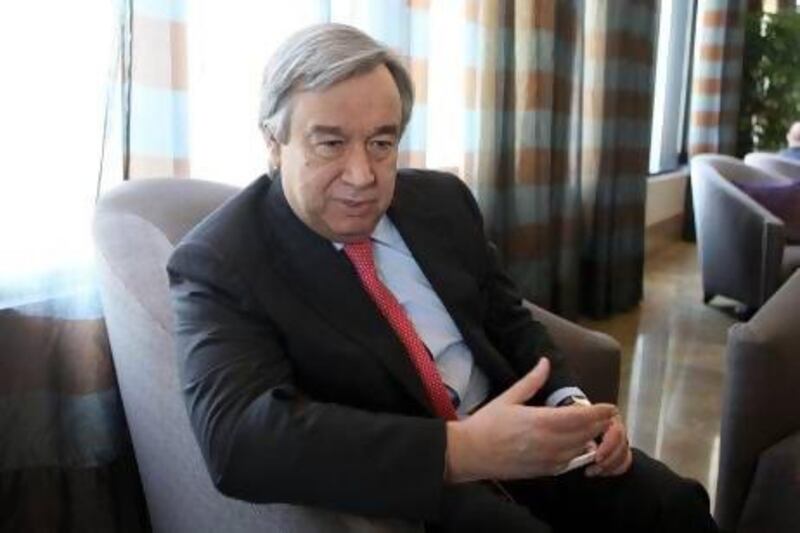ABU DHABI //Charity organisations are being urged to work with international aid agencies in planning and coordinating the next response plan to the Syrian crisis to be drafted next month.
The UN will issue an appeal on behalf of 60 humanitarian organisations outlining the needs of Syrian refugees for the next six months and urge donors to contribute generously.
"The UAE has been very actively supporting the Syrian refugees," said Antonio Guterres, the United Nations High Commissioner for Refugees.
Mr Guterres was in the UAE to strengthen cooperation with the Government, the UAE Red Crescent and Khalifa Foundation and to open the 10th Dubai International Humanitarian Aid and Development conference and exhibition.
"Our objective is to make sure that in the next edition of the regional response plan to be presented in May, not only other NGOs and international organisations, but also Emirati institutions are part of the plan, which means that they participate in the planning and programming.
"The very generous commitment of the UAE and effective action that UAE organisations are doing on the ground can be closely coordinated with the UN and other NGOs."
The Syrian conflict has so far claimed the lives of 70,000 people and forced more than a million to flee to neighbouring Lebanon, Turkey and Jordan. Three million refugees are expected to leave the country by the end of the year.
At the International Donors Conference for Syria in Kuwait in January, the UAE pledged Dh1.1 billion in aid. The following week, the Foreign Minister, Sheikh Abdullah bin Zayed, made it clear that the aid would be delivered directly by the UAE Red Crescent, without the involvement of the UN.
The clarification followed concerns raised by the Syrian opposition that the UN relief strategy had been drafted in cooperation with the regime in Damascus.
Mr Guterres said even if the UAE were delivering its own assistance, it should work in tandem with other NGOs.
"What we want is, even if it's bilateral activities, that what the Emirates does is directly linked and interconnected with the actions of other international organisations because the drama is so big, the suffering is so big, and destruction is such that we cannot afford to have duplications and leave gaps."
The UAE, Saudi Arabia and Kuwait made a joint pledge of US$1.5 billion (Dh5.51bn) at the Kuwait Conference. UN officials said $200 million had been spent so far.
Mr Guterres said: "I think the UAE has a very important role to play. If you look at the UAE's efforts, they are truly humanitarian. They don't have any political agenda. They just try to help people whoever they are, wherever they are. This gives the UAE credibility that we hope can help facilitate a solution.
"We could reach more than three million refugees by the end of the year. It is not just a moral imperative to end this war.
"To stop this war is essential and [we need to] do everything possible to allow Syria to rebuild itself sooner rather than later."
Mr Guterres said the conflict had diverted the focus from other crises around the world.
"We need to take into account we still have the same Darfurians in Chad, a million Somalian refugees in Kenya, Ethiopia, Djibouti and Yemen, 1.6 million Afghan refugees in Pakistan and a million in Iran. The Rohingya situation in Myanmar is so desperate.
"All these situations have disappeared from the radar of the media and the international community but the suffering of the people is still the same.
"The world has shown little capacity to prevent crises and to timely solve existing ones. The level of suffering is not decreasing but the resources available to deal with it are dramatically lacking."






